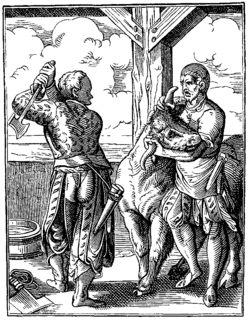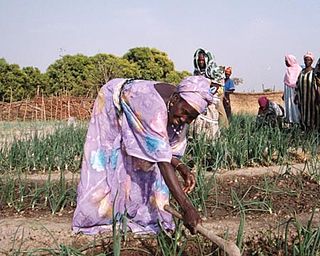
A farmers' market is a physical retail marketplace intended to sell foods directly by farmers to consumers. Farmers' markets may be indoors or outdoors and typically consist of booths, tables or stands where farmers sell fruits, vegetables, meats, cheeses, and sometimes prepared foods and beverages. Farmers' markets exist in many countries worldwide and reflect the local culture and economy. The size of the market may be just a few stalls or it may be as large as several city blocks. Due to their nature, they tend to be less rigidly regulated than retail produce shops.

Fjordland is a Norwegian food manufacturer that produces easy made dinners, margarine, yogurt and other dessert dairy products. It is owned by the three agricultural cooperatives Tine, Nortura and Hoff and uses raw products from the three owners as well as seafood. In addition to dinners branded as Fjordland, the company makes the product brands Brelett, Bremykt, Kos, Safari and Yoplait.

Farmland Industries was the largest agricultural cooperative in North America when it eventually sold all of its assets in 2002–04. During its 74-year history, Farmland served its farmer membership as a diversified, integrated organization, playing a significant role in agricultural markets both domestically and worldwide.
Smithfield Foods, Inc., is a meat-processing company and wholly owned subsidiary of WH Group of China. Founded in 1936 as the Smithfield Packing Company in Smithfield, Virginia, by Joseph W. Luter and his son, the company is the largest pig and pork producer in the world. In addition to owning over 500 farms in the United States, Smithfield contracts with another 2,000 independent farms around the country to grow Smithfield's pigs. Outside the U.S., the company has facilities in Mexico, Poland, Romania, Germany and the UK. Globally the company employed 50,200 in 2016 and reported an annual revenue of $14 billion. Its 973,000-square-foot meat-processing plant in Tar Heel, North Carolina, was reported in 2000 to be the world's largest, processing 32,000 pigs a day.
Coop Norge SA is a Norwegian cooperative. It is owned by 117 local cooperatives with more than 1.3 million members. The company has its headquarters in Oslo.

Animal slaughter is the killing of animals, usually referring to killing domestic livestock. In general, the animals would be killed for food; however, they might also be slaughtered for other reasons such as being diseased and unsuitable for consumption. The slaughter involves some initial cutting, opening the major body cavities to remove the entrails and offal but usually leaving the carcass in one piece. Such dressing can be done by hunters in the field or in a slaughterhouse. Later, the carcass is usually butchered into smaller cuts.
The Danish cooperative movement was a cooperative movement with profound influence on the economical, organizational and industrial development of Denmark from the 1790s to the 1960s. The movement originally emerged in rural communities and was used widely in farming and the industrial development of the agricultural industry. It soon diversified into consumer organizations and in modern times, housing, retail and banking among other sectors.
Einar Enger is a Norwegian business executive who is chief executive officer of Norwegian State Railways.
The agricultural cooperatives in Norway consists of 13 companies, each organised as independent farmer owned cooperatives. They cover four different areas for the farmers: refining and sale of produce, financial services, breeding and insemination, and retail of agricultural equipment. All the cooperatives cooperate through the company Norsk Landbrukssamvirke. In total the companies have a revenue of NOK 58 billion and have 18,000 employees. TINE and Nortura are each responsible for about a quarter of the revenue each. Though none of the cooperatives hold any monopolies, their dominant position periodical causes debate about the structure of the agricultural processing industry.

Nortura is a Norwegian agricultural cooperative that operates slaughterhouses and other processing plants related to meat and eggs. The company was created as a merger between Gilde Norsk Kjøtt and Prior Norge in 2006, and has head offices in Oslo. It processed 222 thousand tonnes of meat at 31 plants in 2017.
Prior Norge is a defunct Norwegian white meat and egg processing company organised as an agricultural cooperative. The company merged with Gilde Norsk Kjøtt in 2006 to create Nortura. The Prior brand is still used.
Prior is a brand name used by Nortura on its eggs and white meat. The brand dates back to 1977 when Norsk Eggcentral rebranded Sol-egg to Prior. The brand was owned by Prior Norge until 2006 when it merged with Gilde Norsk Kjøtt to form Nortura.

Terina is a brand name used by the Norwegian meat processing company Nortura on its frozen and canned food. The production uses raw products from Gilde but is processed through the subsidiary Terina AS. There are processing plants in Namsos, Tynset, Sogndal and Lillehammer. Annual production was 17,000 tonnes with a revenue of NOK 1.4 billion and 300 employees in 2005.
Beef rings are cooperative groups of six to twenty-four farms, with each member of the cooperative being required to supply one animal over the course of the summer to the cooperative for slaughter they are either done locally on the farm or at a slaughterhouse at the member's expense.
Cooperatives of Norway have been created to represent the interest of either customers or suppliers. Areas with cooperatives include retailing, food manufacturing, banking and insurance. Most cooperatives are registered as BA entities.

Danish Bacon was a brand under which Danish bacon was sold in the United Kingdom. The product had "Danish" stamped on the rind between wavy lines. The Danish farmers producing Danish Bacon and their co-operatives were represented by Danske Slagterier, whose UK subsidiary was the Danish Bacon and Meat Council. Danske Slagterier was absorbed into the Danish ministry of Agriculture and Food in 2009. The majority of Danish bacon is produced through the farmer-owned co-operative Danish Crown. The co-operative system has low costs because of the scale and the elimination of the need for markets. Most of the production is for export.
Halal meat is meat of animal slaughtered according to Quran and Sunnah and thus permitted for consumption by Muslims.















